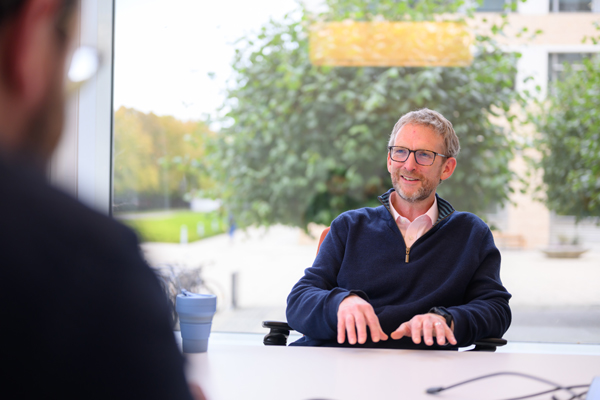Exam boards are playing a “game of cat and mouse” with cyber criminals and an attack could jeopardise a future exam series, the new head of Cambridge OCR has warned.
Myles McGinley, who took over as managing director of UK education at Cambridge University Press and Assessment last month, also called on the government and exams regulator Ofqual to set out a “vision” for the future of digital assessment.
Defending recent rises in exam fees charged to schools, McGinley said boards were working “in an environment where costs of our suppliers have gone up, but also actually the threats that we are dealing with now are quite different from a cyber security perspective”.
Asked if there was a risk that a cyber-attack could jeopardise a future exam series, McGinley said: “Of course. I mean, you look at banks, supermarkets, Transport for London…
‘We’re not immune to hack threat’
“We’re not immune. We work in the same environment, and we take it incredibly seriously.”
The education sector has been rocked by some recent serious cyber-attacks.
School staff data such as passport and national insurance numbers was exposed in a “malicious” attack on the software supplier of Single Central Record (SCR). The company says it manages more than 350,000 staff records at 1,500 schools.
Describing the preventative work as a “game of cat and mouse”, McGinley said Cambridge OCR had a “lot of technology that’s in place to secure our whole estate.
“It’s a massive, co-ordinated effort,” he admitted.
This includes increased monitoring of threats and training for staff and schools around vulnerabilities.
OCR also measures its work against the government-backed “cyber essentials plus” kitemark, which requires organisations to put controls in place such as malware protection and multi-factor identification. The board has also launched a vocational qualification in cyber security and networks.
‘Digital experimentation phase’
But, just as technology represents a huge threat to the exams system, it also offers huge potential benefits in the form of on-screen assessment.
McGinley believes we need to be “clear on the opportunity and the benefits” during what he calls the “experimentation phase”.
He added: “If you go into an exam, you are using a computer, you are coding live, you are seeing whether something works or not. You are able to change variables, parameters. It has a positive washback on teaching and learning as well.”
There is also “the potential digital has to solve some of the problems that people are talking about within the system. If you think about the growth we have seen with anxiety, with special educational needs…”

OCR has been “surprised how empowering” it was to give students greater “ability to control their assessment experience in the way that is needed for them”, for example by changing font sizes and text colour or using an on-screen timer.
“What we really need [is a] bit of vision about the future of assessment, and that is what we are trying to talk about. But we need to be doing this nationally, i.e. from government, regulator.
“It feels like there are lots of separate conversations going on and individual pitches being made, whereas we could do with a bit of momentum.”
Financial burden of exams ‘very real’
But McGinley acknowledges there are concerns – about security and access.
“How can we be confident that a student who doesn’t have these devices at home is getting enough practice in a setting?”
Could digital exams have a cost benefit for schools? He accepted the “very real” financial burden of exams on schools and colleges.
“Whether digital can be the silver bullet for that would, I think, depend on the speed of transition.”
Digital comes with “a different cost”. Hardware, for example. And it “also possibly comes with a scale problem of having computers available all at the same time.
“What I imagine will happen is that we’ll have a mix of paper and digital around for a long time while we work out these things.”
But there are other benefits.
The huge number of GCSE English and maths re-sits means some colleges “have to close from a teaching and learning perspective” while the tests are taking place. More students also need access arrangements, such as different coloured paper.
“It’s not just the exam fees. There are lots of other things associated with doing an exam. Just printing out all those coloured papers – it all adds up.
“So that’s where digital could have potential, not just giving a student a better assessment experience, but reducing some of the cost and administrative burden.”
Vocational qualification warning
Raised in Bromley, south-east London, McGinley attended a state primary and then St Dunstan’s College in Catford. Descended from a farming community in Ireland, he described the “breezy old Victorian building” as “so alien”.
He studied English and history at Salford University, then taught English in Berlin before returning to work at Oxford University Press and spent 18 years at Pearson. He joined Cambridge in 2019.
Cambridge OCR remains a small player in England’s GCSE market. For three years it has held a market share of 6.7 per cent for the key stage 4 qualifications.
Welsh board Eduqas recently announced it had overtaken OCR as the third of four exam boards for the qualifications in England, with 7.1 per cent of the market.

But its share in some qualifications is much larger. It retains just over 20 per cent of the A-level market in England, third to Edexcel’s 28 per cent and AQA’s 46 per cent.
Cambridge OCR’s international arm is also much larger than its English operations, and the board has “really grown” in vocational qualifications.
McGinley thinks the focus of the last and current government on ensuring “confidence” in vocational qualifications” is “absolutely right, we haven’t shied away from that”.
But “the trick is not to lose the essence of what a vocational qualification is doing. It’s doing something different”.
OCR has benefited from a “growth in that mixed curriculum” in sixth form.
“Making those combinations – maths A-level, physics A-level plus an engineering qualification that’s vocational. That gives you all the academic underpinning you need, but also those skills around teamwork and design and things you might need for engineering.”
Why are teenagers more interested in vocational qualifications? McGinley thinks “kids are more savvy, certainly than I was. I just wanted to do something I enjoyed.
“And I think they have a real view. I’ve got two lads of my own. One is doing film production.
“He wants to be practical, whether it’s script writing or editing or doing cinematography, because that’s the industry he wants to be in.”
Technology has “really opened up industries to kids in a way that wasn’t the case for me when I was at school. They can see these things in action. They’ve got opportunities to make money themselves.”
‘You start to create perverse incentives’
With the final report of the government’s curriculum and assessment review imminent, McGinley is “mindful” of the “capacity that’s in the system to change”.
But “at the same time, there are parts that do need change”. For example, the “wash back” on the rest of the curriculum by the size of GCSE maths and science qualifications.
He is supportive of plans, reported by Schools Week, for reading checks during key stage 3. He would also support a check on numeracy.
“We don’t have a picture nationally about what’s really going on that you can rely on. That’s… the value of a standardised assessment.”
But he acknowledges “concerns about the implementation”, arguing it should not be a “performance measure”.
“This touches on some of the challenges with the exam system as well, the degree to which our system is high stakes. You start to create some perverse incentives.
“For an assessment to work as well as it can, I think we would like to see some heat taken out of that environment for a school or college, so they can focus on teaching.”
















Your thoughts